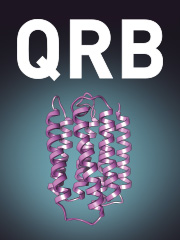Crossref Citations
This article has been cited by the following publications. This list is generated based on data provided by
Crossref.
Steinmetzger, Christian
Bessi, Irene
Lenz, Ann-Kathrin
and
Höbartner, Claudia
2019.
Structure–fluorescence activation relationships of a large Stokes shift fluorogenic RNA aptamer.
Nucleic Acids Research,
Swetha, Puchakayala
Fan, Ze
Wang, Fenglin
and
Jiang, Jian-Hui
2020.
Genetically encoded light-up RNA aptamers and their applications for imaging and biosensing.
Journal of Materials Chemistry B,
Vol. 8,
Issue. 16,
p.
3382.
Hoog, Tanner G.
Aufdembrink, Lauren M.
Gaut, Nathaniel J.
Sung, Rou‐Jia
Adamala, Katarzyna P.
and
Engelhart, Aaron E.
2020.
Rapid deployment of smartphone‐based augmented reality tools for field and online education in structural biology.
Biochemistry and Molecular Biology Education,
Vol. 48,
Issue. 5,
p.
448.
Di, Ya
Wang, Ping
Li, Chunyan
Xu, Shufeng
Tian, Qi
Wu, Tong
Tian, Yaling
and
Gao, Liming
2020.
Design, Bioanalytical, and Biomedical Applications of Aptamer-Based Hydrogels.
Frontiers in Medicine,
Vol. 7,
Issue. ,
Bissaro, Maicol
Sturlese, Mattia
and
Moro, Stefano
2020.
Exploring the RNA-Recognition Mechanism Using Supervised Molecular Dynamics (SuMD) Simulations: Toward a Rational Design for Ribonucleic-Targeting Molecules?.
Frontiers in Chemistry,
Vol. 8,
Issue. ,
Ghaem Maghami, Mohammad
Dey, Surjendu
Lenz, Ann‐Kathrin
and
Höbartner, Claudia
2020.
Repurposing Antiviral Drugs for Orthogonal RNA‐Catalyzed Labeling of RNA.
Angewandte Chemie International Edition,
Vol. 59,
Issue. 24,
p.
9335.
Steinmetzger, Christian
Bäuerlein, Carmen
and
Höbartner, Claudia
2020.
Supramolecular Fluorescence Resonance Energy Transfer in Nucleobase‐Modified Fluorogenic RNA Aptamers.
Angewandte Chemie International Edition,
Vol. 59,
Issue. 17,
p.
6760.
Micura, Ronald
and
Höbartner, Claudia
2020.
Fundamental studies of functional nucleic acids: aptamers, riboswitches, ribozymes and DNAzymes.
Chemical Society Reviews,
Vol. 49,
Issue. 20,
p.
7331.
Steinmetzger, Christian
Bäuerlein, Carmen
and
Höbartner, Claudia
2020.
Supramolecular Fluorescence Resonance Energy Transfer in Nucleobase‐Modified Fluorogenic RNA Aptamers.
Angewandte Chemie,
Vol. 132,
Issue. 17,
p.
6826.
Ghaem Maghami, Mohammad
Dey, Surjendu
Lenz, Ann‐Kathrin
and
Höbartner, Claudia
2020.
Repurposing Antiviral Drugs for Orthogonal RNA‐Catalyzed Labeling of RNA.
Angewandte Chemie,
Vol. 132,
Issue. 24,
p.
9421.
Trachman, Robert J.
Cojocaru, Razvan
Wu, Di
Piszczek, Grzegorz
Ryckelynck, Michael
Unrau, Peter J.
and
Ferré-D’Amaré, Adrian R.
2020.
Structure-Guided Engineering of the Homodimeric Mango-IV Fluorescence Turn-on Aptamer Yields an RNA FRET Pair.
Structure,
Vol. 28,
Issue. 7,
p.
776.
Kharel, Prakash
Becker, Gertraud
Tsvetkov, Vladimir
and
Ivanov, Pavel
2020.
Properties and biological impact of RNA G-quadruplexes: from order to turmoil and back.
Nucleic Acids Research,
Vol. 48,
Issue. 22,
p.
12534.
Mieczkowski, Mateusz
Steinmetzger, Christian
Bessi, Irene
Lenz, Ann-Kathrin
Schmiedel, Alexander
Holzapfel, Marco
Lambert, Christoph
Pena, Vladimir
and
Höbartner, Claudia
2021.
Large Stokes shift fluorescence activation in an RNA aptamer by intermolecular proton transfer to guanine.
Nature Communications,
Vol. 12,
Issue. 1,
Huang, Zhen
and
Niu, Li
2021.
RNA aptamers for AMPA receptors.
Neuropharmacology,
Vol. 199,
Issue. ,
p.
108761.
Chakravarthy, Anirudh
Nandakumar, Anirudh
George, Geen
Ranganathan, Shyamsundar
Umashankar, Suchitta
Shettigar, Nishan
Palakodeti, Dasaradhi
Gulyani, Akash
and
Ramesh, Arati
2021.
Engineered RNA biosensors enable ultrasensitive SARS-CoV-2 detection in a simple color and luminescence assay.
Life Science Alliance,
Vol. 4,
Issue. 12,
p.
e202101213.
Wang, Chao
Chi, Weijie
Qiao, Qinglong
Tan, Davin
Xu, Zhaochao
and
Liu, Xiaogang
2021.
Twisted intramolecular charge transfer (TICT) and twists beyond TICT: from mechanisms to rational designs of bright and sensitive fluorophores.
Chemical Society Reviews,
Vol. 50,
Issue. 22,
p.
12656.
Kong, Kristen Y.S.
Jeng, Sunny C.Y.
Rayyan, Batool
and
Unrau, Peter J.
2021.
RNA Peach and Mango: orthogonal two-color fluorogenic aptamers distinguish nearly identical ligands.
RNA,
Vol. 27,
Issue. 5,
p.
604.
Banco, Michael T.
and
Ferré-D'Amaré, Adrian R.
2021.
The emerging structural complexity of G-quadruplex RNAs.
RNA,
Vol. 27,
Issue. 4,
p.
390.
Chen, Junxiao
Li, Na
Wang, Xingyu
Chen, Jianzhong
Zhang, John Z. H.
and
Zhu, Tong
2021.
Molecular mechanism related to the binding of fluorophores to Mango-II revealed by multiple-replica molecular dynamics simulations.
Physical Chemistry Chemical Physics,
Vol. 23,
Issue. 17,
p.
10636.
Aroonsri, Aiyada
Kongsee, Jindaporn
Gunawan, Jeremy David
Aubry, Daniel Abidin
and
Shaw, Philip James
2021.
A cell-based ribozyme reporter system employing a chromosomally-integrated 5′ exonuclease gene.
BMC Molecular and Cell Biology,
Vol. 22,
Issue. 1,


